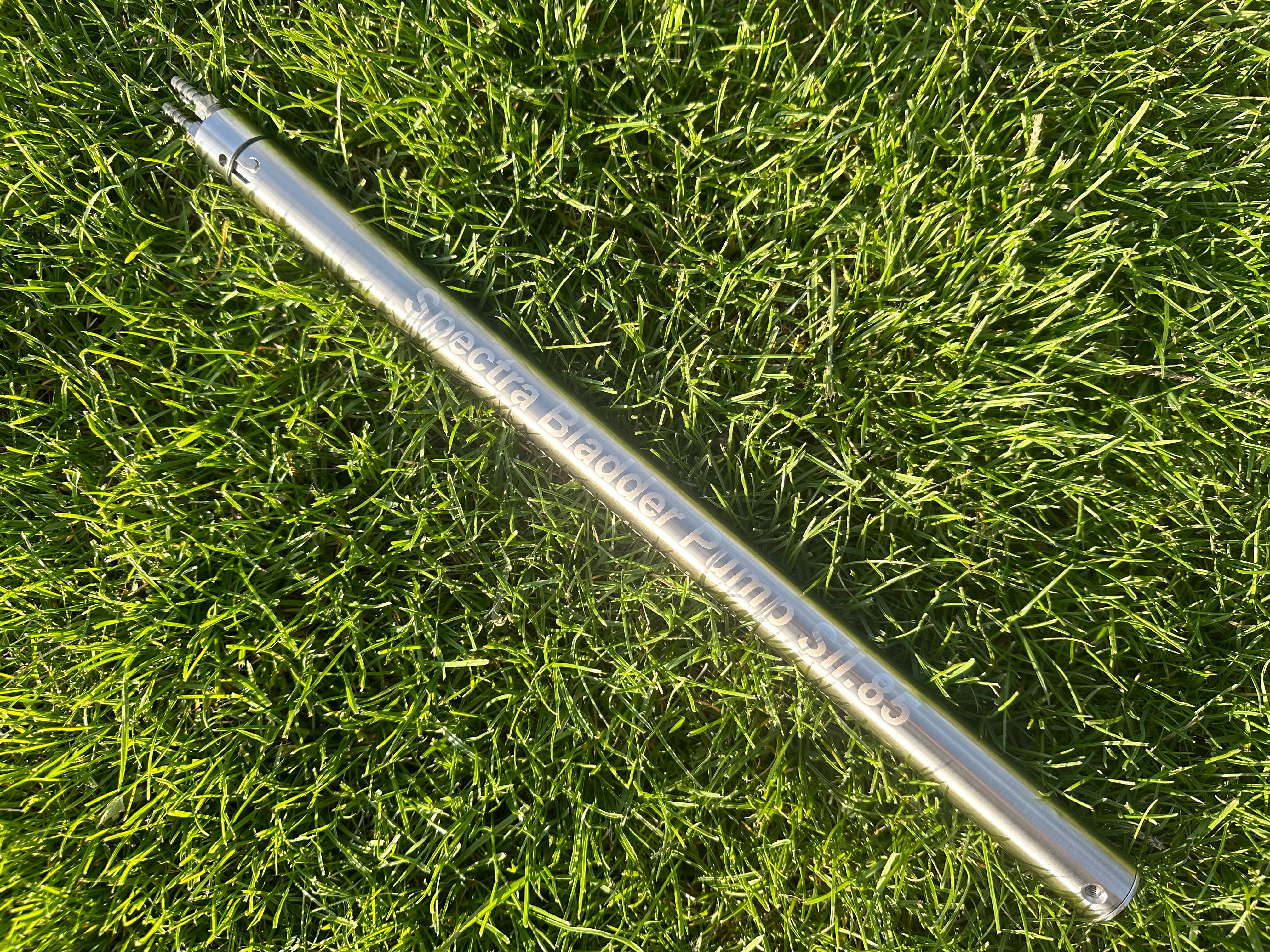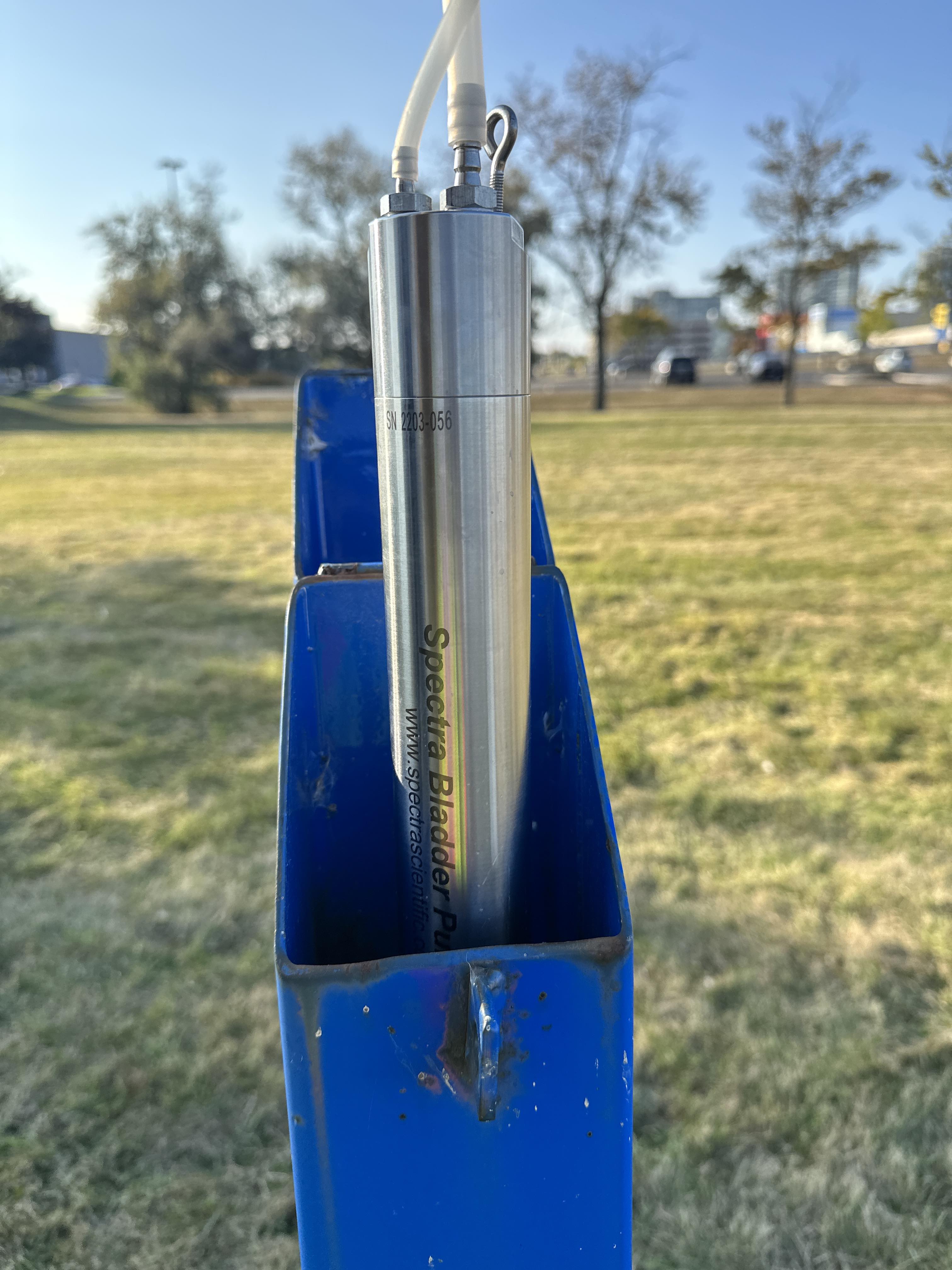Dedicated Bladder Pumps
What are dedicated Bladder Pumps?
Introduction to Environmental Monitoring
What is a Bladder Pump?

The Importance of Low Flow Sampling
Monitoring Groundwater in Landfills

How Dedicated Spectra Bladder Pumps can save you time, money and the headache of quarterly Landfill sampling events.
In the field of environmental monitoring, precision and reliability are paramount. This is especially true when monitoring groundwater quality in challenging environments such as landfills, where contaminants like PFAS (per- and polyfluoroalkyl substances) pose significant environmental and public health risks. To achieve accurate results, dedicated bladder pumps have become an essential tool in low flow sampling methods. In this post, we’ll explore the importance of bladder pumps in groundwater monitoring, with a focus on how the Spectra Bladder Pump Sil Series and the Spectra Hydro Pro can help aid in successful monitoring projects.
Bladder pumps are specialized instruments designed to collect groundwater samples with minimal disturbance, making them ideal for low flow sampling. As noted by Barceló and Petrović (2017), "Bladder pumps are preferred for sampling groundwater where the chemical integrity of the water must be preserved, as they do not introduce contaminants and ensure that the sample remains representative of in-situ conditions."
Dedicated bladder pumps are permanently installed at monitoring sites, such as wells, to provide consistent sampling without the need for decontamination between uses. This is crucial in environments like landfills, where cross-contamination can lead to inaccurate results and misleading data. A study by Parker and Cherry (1982) highlighted that "dedicated systems reduce the risk of cross-contamination and ensure that each sample accurately reflects the local groundwater conditions, leading to more reliable monitoring outcomes."

Low flow sampling is a method used to collect groundwater samples at a slow rate, reducing sediment disturbance and minimizing the risk of drawing in contaminants from outside the target zone. According to Puls and Barcelona (1996), "Low flow sampling methods are essential for obtaining representative groundwater samples, particularly in environments where the hydrogeochemistry is complex and sensitive to disturbance."
Dedicated bladder pumps are particularly well-suited to low flow sampling, as they can be precisely controlled to maintain the desired flow rate. This ensures that the samples collected are as close to natural groundwater conditions as possible, providing reliable data for environmental assessments. Barcelona et al. (2005) further emphasize that "The controlled flow rate of bladder pumps during low flow sampling ensures that the physicochemical parameters of the groundwater remain stable, leading to more accurate and reproducible results."
Landfills present unique challenges for groundwater monitoring due to the complex mixture of chemicals and waste materials that can leach into the surrounding groundwater. Continuous and accurate monitoring is essential to detect and mitigate potential contamination. The U.S. Environmental Protection Agency (EPA) highlights that "Landfills are potential sources of groundwater contamination, and ongoing monitoring is critical to prevent the migration of hazardous substances into the water supply" (EPA, 2013).
Dedicated bladder pumps play a vital role in landfill groundwater monitoring by providing consistent, reliable samples over time. The permanent installation of these pumps ensures that samples are taken from the same location under consistent conditions, making it easier to track changes in groundwater quality. According to a study by Mackay and Cherry (1989), "Long-term monitoring with dedicated systems allows for the detection of temporal trends in contaminant concentrations, which is critical for assessing the effectiveness of remediation efforts."

PFAS monitoring has become a critical aspect of environmental monitoring due to the persistence and potential health risks associated with these substances. PFAS are known for their resistance to breakdown, leading to long-term contamination in water sources. Dedicated bladder pumps are particularly useful in PFAS monitoring because they provide consistent, high-quality samples that are crucial for detecting these persistent contaminants. Guelfo and Adamson (2018) stated, "The use of PFAS-free sampling equipment, such as dedicated bladder pumps, is essential to avoid introducing false positives during sampling and ensuring the accuracy of PFAS concentration measurements."
At Spectra Scientific, we understand the importance of reliable and precise groundwater monitoring, which is why we offer advanced solutions like the Spectra Bladder Pump Sil 2.0 and the Spectra Hydro Pro.
Spectra Bladder Pump Sil 2.0: This pump is designed for high-performance sampling in various environments, including landfills. Its innovative design ensures that samples are collected with minimal disturbance, making it ideal for low flow sampling. The SIL 2.0 is also PFAS-free, ensuring that the pump itself does not contribute to contamination during sampling, which is crucial for accurate PFAS monitoring, where even the smallest contaminant can skew results.
Spectra Hydro Pro: The Hydro Pro is a versatile and reliable pump that excels in both low flow and high flow sampling applications. It’s designed to withstand harsh environmental conditions, making it a durable choice for long-term groundwater monitoring projects. The Hydro Pro is also compatible with a wide range of monitoring setups, ensuring that it can be integrated seamlessly into existing systems.
References: